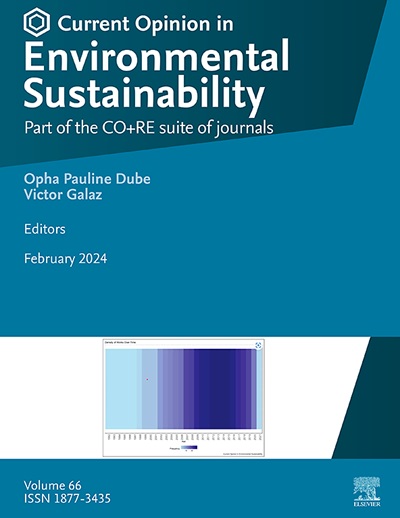揭示普遍存在的假设:在保护中超越贫困-生物多样性丧失的关联
IF 6.3
2区 环境科学与生态学
Q1 ENVIRONMENTAL SCIENCES
Current Opinion in Environmental Sustainability
Pub Date : 2025-05-08
DOI:10.1016/j.cosust.2025.101537
引用次数: 0
摘要
本文反思了在保护研究和实践中贫困导致生物多样性丧失的观点(贫困-生物多样性丧失协会[PBLA])的持续存在。我们利用证据来展示PBLA如何被证明对反证据具有抵抗力,并且在地方一级的实施中特别明显,并且通常隐含在保护策略中。我们梳理了三个潜在的原因,这些原因有助于解释为什么PBLA一直保持着一种真实性(表面上的真相),这可以让它隐藏在众目睽睽之下。通过这样做,我们为保护科学和实践提供了认识和纠正这种思想的方法,并通过这样做,推动保护朝着公平有效的目标发展。我们概述了互联保护模式如何能够更好地挑战财富在生物多样性下降中所起的不成比例的作用,同时赋予生物多样性管理者及其多元知识、价值观和治理体系权力。本文章由计算机程序翻译,如有差异,请以英文原文为准。
Unveiling pervasive assumptions: moving beyond the poverty-biodiversity loss association in conservation
This paper reflects on the continued persistence of the idea in conservation research and practice that poverty drives biodiversity loss (the poverty-biodiversity loss association [PBLA]). We draw on evidence to show how the PBLA has proven resistant to counter-evidence and is particularly visible at local-level implementation, and is often implicit in conservation strategies. We untangle three underlying reasons that help to explain why the PBLA has persisted under a verisimilitude (seeming truth) that can leave it hiding in plain sight. In doing so, we offer conservation science and practice the means to recognise and thereby remedy this thinking where it exists, and in so doing, advance conservation towards its aims of equitable and effective delivery. We outline how the Connected Conservation model may be better equipped to challenge the disproportionate role of wealth in biodiversity decline whilst empowering biodiversity stewards and their plural knowledge, values and governance systems.
求助全文
通过发布文献求助,成功后即可免费获取论文全文。
去求助
来源期刊

Current Opinion in Environmental Sustainability
ENVIRONMENTAL SCIENCES-ENVIRONMENTAL SCIENCES
CiteScore
13.80
自引率
2.80%
发文量
52
审稿时长
6-12 weeks
期刊介绍:
"Current Opinion in Environmental Sustainability (COSUST)" is a distinguished journal within Elsevier's esteemed scientific publishing portfolio, known for its dedication to high-quality, reproducible research. Launched in 2010, COSUST is a part of the Current Opinion and Research (CO+RE) suite, which is recognized for its editorial excellence and global impact. The journal specializes in peer-reviewed, concise, and timely short reviews that provide a synthesis of recent literature, emerging topics, innovations, and perspectives in the field of environmental sustainability.
 求助内容:
求助内容: 应助结果提醒方式:
应助结果提醒方式:


